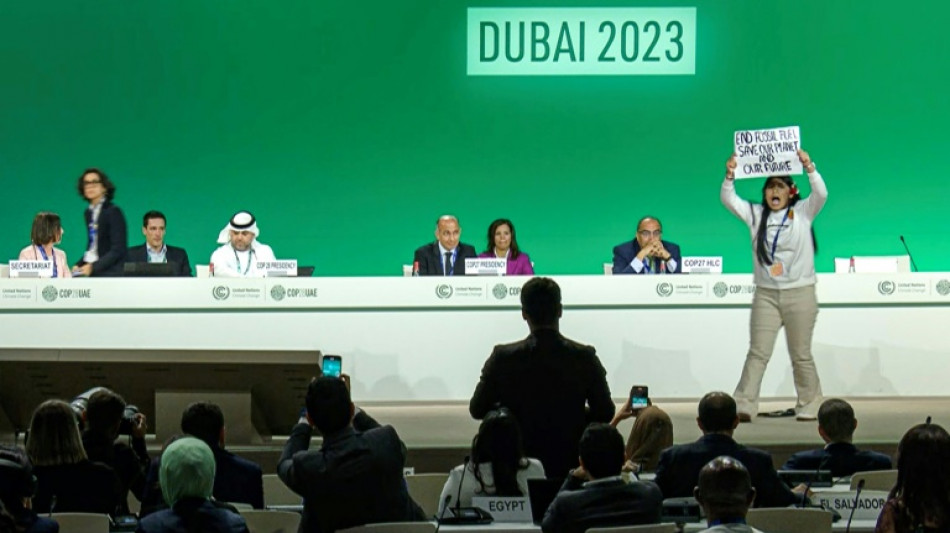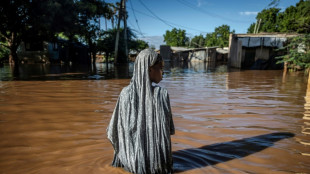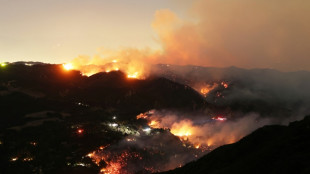

Fury as climate draft deal falls short of fossil fuel phase-out
UN climate negotiations dragged into the early hours of Tuesday after the Emirati host of COP28 drew fire from Western powers and environmentalists over a draft deal that stopped short of calling for a phase-out of fossil fuels.
With hours to go until the Dubai summit officially ends, US climate envoy John Kerry told ministers that this was "the last COP that we'll have a chance to be able to keep 1.5 degrees alive. This is it."
The landmark 2015 Paris Agreement set the increasingly elusive target of limiting warming to 1.5 degrees Celsius (2.7 degrees Fahrenheit) from pre-industrial levels in order to avoid the worst ravages of climate change.
"I don't think anybody here wants to be associated with the failure to live up to this responsibility. Not a lot of people in public life are asked to make life and death choices historically," Kerry said.
"This is a war for survival," he said in the closed-door session, which a group of observers were able to watch outside the room via a live webcast that one of them had access to and AFP saw.
To meet the target, scientists say governments must massively deploy renewable energy while winding down the use of oil, gas and coal -- the fossil fuels responsible for the bulk of heat-trapping greenhouse gas emissions.
"Many of us have called for the world to largely phase out fossil fuels," Kerry told the ministers.
He added: "I think most of you here refuse to be part of a charade."
Small island states which fear that climate change threatens their very existence accused the Emiratis of ignoring their interests.
"The republic of the Marshall Islands did not come here to sign our death warrant," said its negotiator John Silk, demanding an end to fossil fuels.
COP28 president Sultan Al Jaber released a text aimed at bringing consensus between nearly 200 countries, which include Saudi Arabia and other oil and gas producers seeking to preserve their economic lifeblood.
After an earlier draft listed the landmark option of a "phase-out" of oil, gas and coal, the new version released Monday afternoon focused on "reducing" their production and consumption in order to achieve net-zero emissions by 2050.
- 'Opening gambit' -
Jaber, whose role as president of the UAE national oil company has drawn criticism from environmentalists, called his proposal a step forward and said he still sought "high ambition" on the fossil-fuel language.
A person familiar with the COP28 presidency's thinking called the text "an opening gambit" that could be built upon.
If the text aimed to win over the Saudis, it disappointed Western powers, which said they would seek stronger language.
European ministers said they were disappointed with the text and warned they were ready for prolonged negotiations, which Jaber had hoped to close by 11:00 am (0700 GMT) on Tuesday.
"This text is insufficient. There are elements that are not acceptable as they are," French negotiator Agnes Pannier-Runacher said.
The text does not go so far as to demand actions on fossil fuels, only presenting measures that nations "could" take.
Canadian climate minister Steven Guilbeault took issue with the conditional verb.
"This is not a menu in a restaurant. We have to do all of these things," Guilbeault, who was among a group of ministers who were tasked by Jaber to shepherd the negotiations, told AFP.
- 'Verge of failure' -
The draft agreement says countries can take actions that include "reducing both consumption and production of fossil fuels, in a just, orderly and equitable manner so as to achieve net zero by, before, or around 2050 in keeping with the science".
On coal, the dirtiest major form of energy, the text lists limitations on "new and unabated coal power" -- meaning going ahead with potential projects that use new carbon capture and storage (CCS) technologies.
Critics say carbon capture technology remains too expensive and would never be enough on its own to meaningfully reduce emissions.
The COP28 text calls for accelerating the deployment of zero and low-emission technologies, including renewables, nuclear power and CCS, "so as to enhance efforts towards substitution of unabated fossil fuels in energy systems".
"COP28 is now on the verge of complete failure," former US vice president Al Gore, who won a Nobel peace prize for his work on climate change, said on X (formerly Twitter).
He said the draft "reads as if OPEC dictated it word for word."
L.Amato--IM




